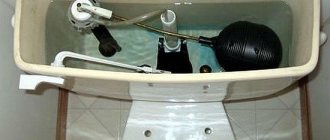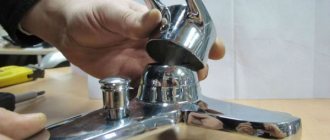Almost every one of us, at least once in our lives, has encountered small discharges of electric current from walls, a wet floor, a water tap, or simply water in the bathroom.
This is especially felt if there are unhealed wounds on the body and in places where the skin is thin. If you do not attach importance to this, then over time the situation may change significantly for the worse.
What to do if there is an electric shock in the bathroom? Before you can fix the problem, you need to find out the cause of it. If the tap “pinches” only once, and when you touch it again nothing happens, then you are most likely dealing with static. But when it hits constantly, then this is a “change” and you need to act immediately.
Theft of electricity or unscrupulous neighbors
The first and most common reason why people sin is unscrupulous neighbors. Suspicions immediately arise that they are trying to steal some electrical energy and save extra kilowatts. This may be caused by their major renovation work on the apartment and the heavy loads associated with this connection - welding machines, electric heat guns, etc.
Or in winter, when the temperature of the central heating batteries is insufficient, they very often begin to use powerful heaters and heaters. Naturally, you can try to connect all this by illegally throwing wires to the wiring in addition to the meter.
The main reason for the appearance of voltage and potential in your bathroom in this case is the discharge of the neutral wire onto radiators, water pipes, sewerage and heating.
It’s true that neighbors may not always be deliberately to blame! Therefore, do not rush to immediately accuse them of stealing electricity.
In old houses with a TN-C grounding system, there is no separate grounding conductor. But many people lately still carry out wiring with three-core cables.
And on the one hand this is correct. The house will undergo reconstruction, the grounding system will change to TN-CS, and you will have everything ready. But until this moment, do not rush to connect such a conductor.
However, some, without waiting for reconstruction, simply use the risers of the nearest water supply as grounding conductors. And they immediately connect to it the very third grounding conductor. Which in turn is connected to the body of the electrical appliance.
And if the insulation of this device breaks through, then the phase will get through the pipes into the neighboring apartments.
Diagnosis of current leakage
If you are electrocuted by tap water, you need to take immediate corrective action. To establish the causes, a fairly extensive set of diagnostic work should be carried out, and it would be better if they were carried out by a professional who has all the clearances, knowledge and experience.
Happy owners prefer to contact specialized companies that provide high-quality diagnostics of all electrical wiring in an apartment, house, office, etc. For example, if neighbors steal electricity at your expense, it is very difficult to establish this, because they can only turn on their homemade system in night time. In such sensitive situations, only the use of ultra-sensitive equipment, which is equipped with all qualified organizations, will help. Diagnostics is also required if the bath is electrocuted.
Diagnostics includes the following activities:
- checking the presence of grounding in electrical appliances (sockets, washing machine, water heaters);
- detection of external wiring damage. To do this, devices are disconnected from electricity and problem areas are gradually identified in the network.
After diagnostic work, it will become clear why the water from the tap is electric.
Important! To prevent such unpleasant situations, electricians recommend installing ceramic sockets in the bathroom.
Old wiring and damaged insulation
The second reason is poor insulation of the existing wiring, which has already expired its warranty period, dried out and cracked in several places. Due to this, from time to time, electrical leaks occur on the surface of walls, pipes and other equipment connected to the bathroom. Most often, this situation occurs in apartments of old construction.
If you live on the second floor or higher, then your bathroom floor is essentially the ceiling of your neighbors below. And just the same, it may contain old wiring for lighting.
Of course, they may not feel anything, but if you get water on the floor, you may noticeably begin to receive an electric shock. Moreover, when touching any surface. You don’t go into the bathroom wearing shoes with an insulating surface, but often with bare feet.
Sometimes a frayed wire in the wall can come into contact with pipes and voltage will flow through them into your apartment.
Malfunction of electrical appliances and heating elements
But most often, electric shocks are possible due to a malfunction of such simple household appliances as a washing machine, titanium boiler, instantaneous water heaters, or dishwasher.
If they do not have a protective grounding, any of them will sooner or later begin to electrocute. In this case, it is enough to simply plug them into the outlet and not even start them. And when you touch the surface of this device or just water, you will begin to “pinch” in a significant way.
If there is a small leak, a slight vibration of the device will be felt.
If the tap water itself is electrocuted (usually the pipes are plastic), then the cause is most likely damage to the water heating devices through which this same water flows.
Here all the blame lies with the heating element. Its insulation is destroyed, cracks appear, the heating coil is exposed and begins to come into direct contact with water. Hence the electric shocks.
If this is one small microcrack, then when the heating element heats up, it will open and the electric shock will be stronger. When the titanium is turned off, the heating element cools down and the crack seems to close, hiding the spiral. The tingling may be barely noticeable or disappear altogether. As the heating element deteriorates, the voltage on the tap water will remain constant.
To find out, you need to “ring” the heating element with an indicator screwdriver or a multimeter.
Moreover, it should be especially noted that water can be electrocuted even if the water heating devices of your neighbors, not yours, are faulty.
It's very easy to find out. Unplug the machine or plug from the heater socket and check for voltage. If it does not disappear, then go to your neighbors and ask them to do the same. When you turn off the power from a faulty water heater, the potential on the water pipes will also disappear.
Security measures
Electrical wiring in wet rooms should include the installation of camouflage covers for sockets, switches, lighting fixtures and other elements of electrical appliances.
If water gets into the outlet, there is a possibility of an electrical leak. Then, when you touch the wall and the bathtub, an unpleasant tingling sensation occurs. Unfortunately, if these problems are not corrected, an injury from an electric shock is quite possible, with unpleasant incidents resulting in medical intervention.
To prevent current leakage, it is recommended to use only plug-in devices. Plug-in electrical appliances provide reliable protection against moisture. To ensure a 100% guarantee against moisture ingress, it is necessary to purchase high-quality electrical appliances, because often the stated characteristics do not coincide with the actual indicators.
When purchasing, carefully inspect the products and make sure they are tight and properly insulated. Despite the presence of housing protection, the devices must be installed in such a way as to minimize the ingress of splashing water.
When carrying out electrical wiring, they try to install the equipment so that the switches are located outside the bathroom. If possible, the distribution box should also be installed outdoors, where there is constant high humidity.
Sources of current leakage can be:
- the presence of a “warm floor” system;
- dysfunction of the vein structure of the heating cable;
- violation of the insulating elements of the heating device. In such cases, to eliminate the leak, it will be necessary to replace the entire “warm floor” system in the premises, since their structure is completely hidden under the floor screed.
If the passage of electric current was noticed in the premises, this does not mean that when troubleshooting the problem, the situation will not happen again. Therefore, you need to take care of precautions for the long term. The following safety measures are known today to ensure the safe use of electrical appliances:
- Installation of a residual current device (RCD) or a combined electrical device - a differential circuit breaker - into the apartment distribution panel. It is recommended to install such RCDs on devices that are most dangerous in case of electric shock.
- Installation of an incoming protective device in the distribution panel, which ensures safety in case of problems with the RCD. Such a device is considered a safety backup option.
- Presence of protective grounding in electrical wiring.
Sometimes it happens that when washing your hands, the water from the tap produces an electric shock due to neighbor's negligence. Recently, pipelines have often been used as a grounding conductor, although this is prohibited by law. If you suspect something like this, contact the supervisory organization immediately. Electricians must identify the cause and eliminate the consequences.
Short circuit in the wiring of the phase and ground conductors
The fourth reason is quite rare, but this may be your case. For example, your bathroom may not have any electrical appliances at all - no washing machine, no boiler, etc. At the same time, there are no neighbors either, and you live in your own separate wooden house. All wiring is made with a three-core cable with a grounding conductor, the panel diagram is assembled according to the rules.
And yet, you still get an electric shock in the bathroom. How is this possible?
There are two reasons:
- poor grounding circuit - they hammered one corner into the ground and considered this sufficient, or the contact was broken at the point of connection to the circuit
- phase short circuit to the grounding conductor, in any of the wiring lines, not necessarily in the bathroom
Well, as a rule, you naturally do not have an RCD in your electrical panel. In this case, a simple circuit breaker will not turn off, since the current for it is too small.
This can happen:
- as a result of screwing a self-tapping screw into the wall, when it simultaneously hits the phase and the yellow-green PE conductor
- when the insulation heats up and the wires in the lighting lamp short out
- Short circuit of phases and grounding conductors in a socket with a grounding contact
- due to a short circuit in a regular plug. The insulation of the phase conductor is rubbed against the pressure plate. And it is usually grounded.
Don't trust cheap carriers and extension cords yet. They need to be disabled first.
And since this conductor is connected to a common grounding bus in the panel, the potential along it will spread throughout the house and apartment.
In this case, you will have voltage on all grounded devices.
You will only feel it first of all in the bathroom, where it is humid and damp. The presence of potential is checked with a screwdriver using an indicator, and it is better to use it with a neon bulb rather than with an LED.
How to fix the problem?
To ensure that none of your family members become victims of electric shock, you must ensure that all devices are grounded. The situation is complicated by the fact that metal water pipes, which previously served as a natural grounding conductor for bathroom plumbing, are being widely replaced with plastic ones that do not perform this function.
Replacing even one section of the pipeline along the riser disrupts the operation of natural grounding. Finding the grounding cable in the panel can be difficult, so it is better to entrust this work to a professional. To avoid problems in the future, you need to take the following preventive measures:
- Install a potential equalization system for all potentially dangerous devices inside the bathroom.
Please note! If you cannot solve the problem of current penetration on your own, then you need to call a specialist from the management company to check the grounding loop. He must check the integrity of the cable, as well as the integrity of the grounding surface of the ground electrode itself, and if necessary, replace it.
There is no or poor contact on the grounding, grounding in the shield
Often, even in newly built houses with 3-wire cable lines, a situation occurs when there is a small voltage within a few tens of volts on the grounding conductor, and accordingly on everything to which it is connected.
It seems that the wiring in the apartment is new, and everything is assembled in junction boxes according to the diagrams with respect to “polarity,” but electric shock occurs everywhere you don’t touch.
The explanation may be very simple. In the apartment panel, all grounding wires are collected in a heap and connected to one common bus.
But it is just neither grounded nor zeroed! The electricians simply forgot to do this. This is where all the problems come from.
Or there is a break somewhere in the main ground wire from the circuit to your panel. Check the voltage in the panel between the ground bus and the phase. It should be stable around 220V. If the voltage “floats” in absolutely arbitrary parameters, then there is clearly a break somewhere.
Why is insulation damaged?
The reasons for damage to the insulation, as well as breakdown of the housing, are mechanical damage that occurred due to blows. The emergency nature of the situation can cause voltage surges. When the socket has loose contacts or a contact box, it acts as the basis for the rapid burnout of the heating element. Be that as it may, during the process of installing an outlet for connecting an electric heated towel rail, it is important to ask the technician to measure the grounding resistance. According to all standards, it should not be higher than 3 Ohms.
How to get rid of electric shocks in the bathroom
If the water faucet constantly shocks, or you feel small discharges and tingling sensations when touching the bathtub body or pipes, the problem must be solved quickly. What are the ways to combat electric shocks in the bathroom?
Some people think: I’ll ground the bathtub and everything will be fine.
However, keep in mind one important point: if you have an extraneous potential applied specifically to the water, then forced grounding only in the bathroom may even worsen the situation!
You will thereby increase the potential difference even more.
Therefore, you should start by checking all electrical appliances and their connection points to the 220 Volt power grid. Unplug them one at a time and check what has changed after each shutdown. This way you can find faulty equipment.
Moreover, disconnect from the network not only appliances installed directly in the bathroom, but throughout the entire house. The reason described above, with a damaged plug or socket with grounding, is clear proof of this.
If it is not the equipment that is to blame, but the wiring under the plaster, some try to swap the outgoing phase with zero on the input switchboard.
This is not recommended. Because there may be zeroed equipment in the apartment.
True, sometimes this measure helps. Since the core with damaged insulation changes from phase to zero and current leakage through it to the damp wall or fittings in it disappears. But the insulation is already damaged in any case and further operation in this mode can lead to a fire!
If the whole point is not a breakdown of your equipment or your wiring, but a breakdown of your neighbors, then this is revealed as follows.
You turn off only the phase on the input circuit breaker or unscrew the phase plug in the panel, and thereby completely de-energize the entire apartment. Turning off both phase and zero at the same time may not produce results, since there will no longer be a potential difference.
If the “tingling” has not disappeared, then now you definitely need to go to the neighbors. Moreover, these may not necessarily be neighbors across the wall, but residents several floors above.
How to ensure electrical safety in the bathroom
In order to protect yourself and your family members from electric shock when visiting the bathroom, you need to do everything correctly from the beginning. First of all, all electrical appliances and metal accessories located within the bathroom must be grounded - the grounding wire of each item must be connected to a common busbar, from which the common cable will go to the grounding busbar located in the distribution panel on the landing.
It will be interesting What parameters are used to select a chandelier for a bathroom?
In addition, all household electrical appliances in the house that have a high degree of energy consumption, such as: boiler, air conditioner, jacuzzi, electric boiler, washing machine, heated electric floors, must be connected directly to the distribution panel, but only through a protective connection device (RCD), which automatically turns off the electrical supply when its leakage exceeds the permissible norm - 30 mA, but it is better to focus on an even lower value by programming the device to operate at a threshold of 10 mA.
It is also advisable to additionally insure yourself by purchasing an indispensable device in our difficult times, designed to equalize potentials, in common parlance SUP. His idea of work is simple, like everything ingenious: if the electrical circuit of the entire house or entrance has a direct connection, without breaks, the electrical potential of the circuit is the same. In the event that one of the neighbors decides to illegally save money by throwing a zero on the water pipes, a break appears in the circuit, and the potential difference can cause voltage to appear in the running water and the surface of the tap.
Requirements for material and wiring cross-section
According to electrical safety requirements for bathrooms, two-core copper wires with a cross-section of at least 2.5 mm must be used as wiring. It is worth drawing your attention to the fact that in the case of connecting all metal and electrical appliances to a single EMS bus, it is necessary to avoid connecting two different metals, for example aluminum and copper, between which oxidation and corrosion processes can occur.
In conclusion, I would like to say only one thing: if you are not a professional electrician, entrust the connection process to professionals. On the one hand, this will slightly increase the budget, but on the other hand, electrical wiring laid and connected correctly will serve you for decades and certainly will not cause such troubles as electric shock.











